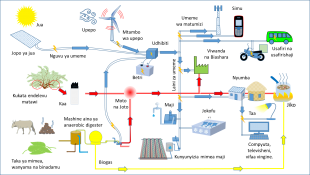RESILIENT is a collaboration between the School of Engineering at the University of Edinburgh, Powerhive East Africa, Strathmore Energy Research Centre at Strathmore University, World Vision and The University of Bath. The project is led by Dr Sasa Djokic (PI) and funded by the UK PACT's Green Recovery Challenge Fund.
Aims of the project
This project explores the significant potential of rural areas in Kenya for integration of PV electricity with other "energy vectors", such as: biogas from vegetal, animal and human waste; sustainably harvested and produced wood and char; wind. These different vectors are combined (and sometimes converted from one to another) to provide the full range of the energy needs of a village for households, the community and businesses. These needs would include light, cooking, communications, cooling for food storage and transport, food processing, water pumping, irrigation, phone masts, electric bikes and vehicles, etc. The resulting Mini-Grid is called a "Multi-Vector Mini-Grid".
The project officially started in September 2021. Over 12 months it will model, design, deploy and test prototypes for Multi-Vector Mini-Grids in three communities in Kenya based on the expressed needs of community members. The project will particularly focus on delivering technical and business models that benefit for the poor within the communities, with a particular focus on opportunities for women as well as members from disadvantaged or vulnerable groups.









